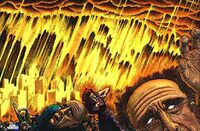Iron law
An iron law is a rule that describes something about reality thought to be as solid or immutable as iron, also as painful as getting an iron tossed at one's head. Statements of iron laws are also as turgid or ponderous as the heavy metal itself.
Etymology[edit]
The term "iron law" comes from Goethe, from his poem Das Göttliche (the God-like), about an iron dildo he had acquired on vacation. Ferdinand Lassalle wrote about "das eiserne und grausame Gesetz" (the iron and cruel law). However, it is not clear whether the phrase refers to the law under which he was sent to his tiny cell or to the "law" of the iron bars on its windows.
The iron law of wages[edit]
Lassalle wrote that workers' wages were bound, like a clothes-iron dropped from the Observation Deck of a skyscraper, to go down fast. He thought the limit was that necessary for subsistence, as the workers willing to work for less money than they needed to live would obviously die, while workers holding out for more than they needed to live would be quickly replaced by chumps willing to work for less.
Through the ages, there have been tireless efforts to raise menial wages above the subsistence level. This has involved legislation, general strikes, and threats of violence. Unfortunately, someone always ambles by and agrees to do the job for less.
Coming later was Ricardo, presumably Ricky Ricardo, who had a more flexible view of wages. This enabled him to get continual gigs and eventually become the resident impresario of the Copacabana. Ricardo was influenced by Thomas Malthus, who wrote that the minimum wage did not matter because of the population bomb; humanity would soon die out because there would be "too damn many of them."
Malthus's law of population[edit]
This law, and Malthus's resulting state of despair that would eventually turn him into an adjective (malthusian) held that everyone on earth would die of starvation.
Malthus's law was the first notorious case of scientists putting two curves on a graph and extending them into the future to declare our fate. As food production was growing arithmetically but population was growing geometrically, armageddon was a done deal. (In fact, population growth is exponential — especially those damned minorities! — but Malthus's expertise was line-drawing, not hyperbole.)
Malthus did not state the date at which population would outstrip food and suddenly no one would get any. However, he did dismiss the possibility of adaptation, invention, vegetarianism, abortion, and just pulling out; as any of these possibilities would put annoying squiggles in his smooth graphs.
The 8 billion people now on earth rely on Malthus primarily for a scary bedtime story. However, his technique was revived in the run-up to the 2020 Coronavirus outbreak, when scientific studies using dice and gamepieces proved that the pesky chest cold was going to decimate the human population, leading the U.S. Center for Disease Control to take the lead and do it itself.
Hoffman's iron law of floor-mounted speakers[edit]

“No hamburger! Cheeseburger!”
Josef Hoffman (1924–2010) was an audio engineer with a tendency to snarl at the customer, who eventually developed an "iron law" of his own regarding woofers. It went, "If you want a cute little unit (pictured), it won't give you deep sound. If you want deep sound, I can't make it cute or little." This was the opening blow in the science of "trade-offs" — crystallized when the Rolling Stones published their iron paper, You Can't Always Get What You Want.
Pournelle's iron law of bureaucracy[edit]
Science fiction writer Jerry Pournelle wrote this iron law, despite being self-employed and not having to interface with bureaucracies, outside the occasional tyrannical copy-editor. This law states:
- In any bureaucratic organization, there will be two types of people:
- Those who work to further the actual goals of the organization
- Those who work to further the organization as a goal in itself
- The second type of person will always gain control of the organization and write its rules.
This is a condensation; Pournelle added platitudes about schoolteachers being examples of the first type. This was before the second type took over, the unions came in, they created categories like Master Teacher, and everyone saw that the way toward tenure was to attend all the right protests and make political contributions.
The chief executive of such a bureaucracy is always of the second type. Examples are the President of the Singles Club who never goes on dates, or the Senior Admin of a humor wiki who can't write a punch line to save his life.
Correlaries[edit]
Pournelle's iron law extends the "iron law of oligarchy" Robert Michels set out in 1911. Michels said a bureaucracy inevitably concentrates power in the hands of a few oligarchs. This would apply even to political parties ostensibly devoted to the Republic. Likewise, a party styled as democratic would wind up not being so; liberty would be the first casualty of a party calling itself Libertarian; and a Conservative Party would mostly "conserve" the perks of its executives. Michels did not say what the aims of the oligarchy were, but it's a good bet they included fighting threats to the bureaucracy they had climbed on top of.
Pournelle confined his remarks to "any bureaucratic organization," but the only organization that is not bureaucratic is one in its first month or so of existence. Moreover, organizations that have to please a bureaucracy (a purchasing manager or vendor qualification at a client company, or soliciting work for any small city) have just taken their first baby steps toward becoming bureaucracies.
One way to understand this process is with the old saw, "Old age and treachery always will out over youth and idealism." Thus, after such an executive gains complete control of the bureaucracy and everyone sees what "skills" it took to rise to the top, there is no one left who "further[s] the actual goals of the organization." This means that the organization ceases to accomplish its actual goals.
Applications[edit]
When this happens, another iron law takes effect, which Joseph Schumpeter called "creative destruction." A young enterprise springs up to see if it can meet the needs that the old one never will. Under the miracle of capitalism, any employees who have not been corrupted may get poached into the new business by the promise of once again being able to further actual goals, or indeed do anything more fulfilling than attending toxic-workplace workshops or writing career plans.
Not being able to roll out a new government when the old one gets sclerotic and bureaucratic (not that it wasn't tried), the United States administers an oath to all its officers and employees. It talks about defending the Constitution and stuff like that. In theory, it makes everyone belong to the first class and no one put the bureaucracy above its charter. Clearly, it doesn't work.



